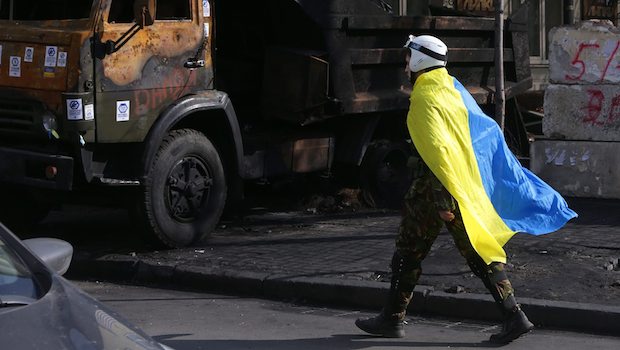
A protester covered with a Ukrainian national flag passes by a destroyed truck near the Ukrainian Parliament building in downtown of Kiev, Ukraine, on February 24, 2014. (EPA/MAXIM SHIPENKOV)
It is easy to dismiss the political divisions that crisscross Ukraine, just as it is easy to forget the international stakes involved in its latest chapter of the story of state building, collapse and rebuilding happening there. Such neglect will ensure that history keeps repeating itself. Instead of turning a collective blind eye to Ukraine, it is necessary to assess the situation even if doing so exposes some delusions about the country and the roles that Russia and the European Union play there.
The first delusion is about the nature of Ukraine itself. It is a country of sharp contrasts and few points of unity. There are linguistic and cultural divisions and ideological confusion. Some people look West, others East. Some are nostalgic for communism while others obsessively seek to join the post-modernity of the “new” Europe. There are rural poor and urban rich. Most pointedly, however, the country literally forms the border between the European Union and Russia (the name “Ukraine” means “at the border”).
Each of Ukraine’s post-Cold War leaders represented only a fraction of the state. They represented “their” people. Ukraine, then, suffers from an endemic legitimacy problem. Consider former President Leonid Kuchma’s decision, in 2004, to ready (then-prime minister) Viktor Yanukovych to take over the presidency and keep Ukraine firmly embedded in Russia’s sphere. The result was a national standoff known popularly as the Orange Revolution.
It was not only political leaders challenging each other; it was about the national identity and direction, and everyone had an opinion. At that time, Yanukovych was checked because opposition leaders Viktor Yushchenko and Yulia Tymoshenko managed to mobilize their followers among the country’s more Western-oriented citizens better than Kuchma and Yanukovych could do with their more industrial constituencies to the country’s east. The Orange Revolution also only spoke to a fraction of the country and it was not long before the revolutionary parties splintered, fractured and exposed the intrinsic weaknesses of party politics in an immature polity.
When Yanukovych finally came to power he wasted no time consolidating it. He had Tymoshenko arrested and sought to undermine the country’s tenuous parliamentary balance. He drew his support from the country’s eastern, Russian-speaking residents and from Moscow. Ironically, his explicit rejection of a decade of European engagement cost him the presidency and now Ukraine is more divided than ever. The demonstrations that toppled Yanukovych are consuming themselves and it will not be long before Ukrainian unity is further eroded and fragmented.
Such leaders and the positions they adopt are encouraged by delusions coming out of Brussels. The EU does not understand Ukraine and Ukraine does not understand the EU. While the recent spate of political activism may have identified the failed Association Agreement with the EU as the trigger for anti-Yanukovych demonstrations, such a sentiment is meant for primarily European audiences. Yanukovych was an administrative dictator and it was against that hyper-bureaucratic ‘throw-the-book-at-national-problems’ approach that brought people to the streets. And yet the EU has been keen to take action in Ukraine, to throw financial support at it as well as to deploy threats and bribes. Despite all this, the EU is not interested in having Ukraine as a member. It is true that it sought to integrate Ukraine into the regional economic life of the Union, but membership and integration are not the same thing. Those young Ukrainians who took to the streets, fought and died because Yanukovych did not sign the Association Agreement died needlessly.
And then there is Russia. Now that the city of Sevastopol has threatened to secede and huge swathes of eastern Ukrainians have begun to rally against the new realities on the ground, the conflict in Ukraine seems destined to intensify and expand. Only Russia will benefit. It will maintain its Black Sea naval presence and get to reconstruct a sliver of its former empire. However, even the Russian are deluded. They are deluded into thinking that Ukrainians will always defer to their leaders or can be forced to. They are wrong. If there is one thing that unites Ukrainians more than anything else is their fierce sense of people power. Ukrainians are neither meek not defeatist. Theirs is a determination unmatched in their region.
The problem, of course, is the competing visions of Ukraine. If Ukrainians were to work together, there is simply no obstacle they could not overcome. However, in their fractured country reeling from a week of violence and two decades of national erosion, hope of domestic peace is also a delusion.
